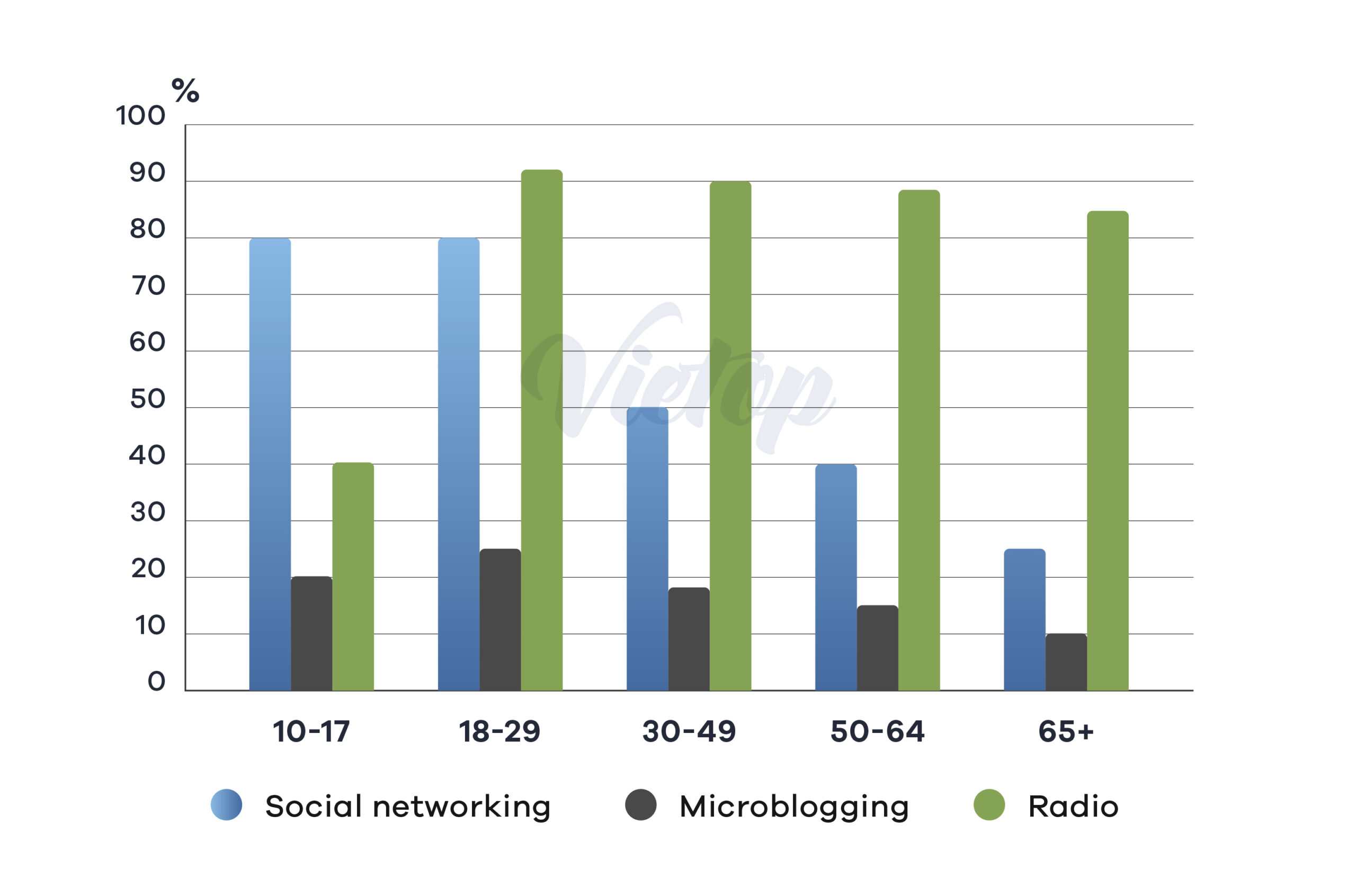Dưới đây là bài mẫu đề thi IELTS Writing Task 1 và 2 ngày 17-04-2021 vừa qua. Cùng xem bài mẫu của VIETOP dưới đây nhé!
Task 1
Đề bài
The bar chart shows type of media to get daily news, by age group 2011

Xem thêm: Cách làm dạng bài Bar Chart trong IELTS Writing Task 1 “chuẩn” bạn cần biết
Sample
The bar chart delineates how people from different age groups utilised different forms of media to receive daily news. The data were recorded for the year 2011.
The initial impression from the chart is that microblogging was the least favoured of the three sorts of media across the age brackets. It is also clear that radio was more popular among adults aged 18 or older, and age is a clear predictor for the decrease in the use of social networking sites.
Social networking was the most popular media among the 10-to-17s, at 80%, which was followed by radio (40%) and microblogging (20%). A different picture, however, could be observed with regard to the remaining age brackets. Radio was the predominant type of media, with its figure standing at around 90% for the 18-to-29s, 30-to-49s, and 50-to-64s, and a little bit lower (85%) for the over 65 group. The figures for social networking were lower across the age ranges, at 80% for the 18-to-29 age group down to 50% for the 30-to-49s, 40% for the 30-to-49s and a low of 25% for the oldest group. Microblogging was always the least preferred platform, varying between 25% and a negligible 10%.
Vocab
- delineate: mô tả chi tiết
- initial impression: ấn tượng ban đầu
- favoured: ưa thích
- age is a clear predictor: tuổi tác là một nhân tố tiên đoán được cho…
- with regard to: liên quan đền (dùng để giới thiệu thông tin)
- age bracket: nhóm tuổi
- predominant: phổ biến nhất
- platform: nền tảng
- negligible: không đáng kể
Task 2
Đề bài
It is now possible for scientists and tourists to travel to remote natural environment, such as South pole.
Do the advantages of this development outweigh the disadvantages?
Sample
Recent advancements in technology have enabled humans to travel to distant places in nature. This is scientifically beneficial to all societies, yet concurrent tourism activities can contaminate the pristine conditions of these places and negate the scientific benefits.
Being able to travel to these places is an unprecedented opportunity for scientific development and application, especially in the field of climatology. Scientists can now travel to pristine locations to collect live specimens, fossils and observe the local natural phenomena that may not have been documented before. For example, studying the layers of the ice cores from the North and South Poles has helped scientists to reconstruct the climatic trends and patterns which date back to millions of years. These findings can add valuable insights and revolutionise the way humans understand our environment in the past and the present. Recently, such findings have been extremely useful in the ongoing discussions on how to solve global issues such as global warming.
Despite unique opportunities it offers to the scientific community, traveling to unspoiled natural destinations could inflict irreparable damage on them when tourism is involved, thereby doing more harm than good. Littering and vandalism are two of some most pressing problems caused by tourism. For example, numerous mountain peaks which previously could only be reached by serious mountaineers have reportedly been polluted and defaced after the installations of aerial tramways which grants unrestricted access to all visitors. The aforementioned remote environments could suffer the same fate when waves of tourists frequently land there. Furthermore, the contamination brought to these locations by touristic activities could also interfere with the quality and accuracy of the scientific research carried out there.
In conclusion, exploiting remote natural locations for tourism could nullify the scientific values they offer and even cause permanent damage to these places. Only selected organizations and individuals who follow strict rules and regulations to preserve these places should be allowed to access.
Vocab
- to contaminate (v): làm bẩn, gây ô nhiễm
- pristine (adj): nguyên sơ
- unprecedented (adj): chưa có tiền lệ
- climatology (n): khí hậu học
- specimen (n): mẫu, tiêu bản trong khoa học
- phenomenon (n, số nhiều = phenomena): hiện tượng
- to date back to (expression): bắt đầu từ (năm nào đó)
- insight (n): sự thấu hiểu, kiến thức sâu
- ongoing (adj): đang diễn ra
- unspoiled (adj): đồng nghĩa với pristine
- irreparable (adj): không thể khôi phục
- vandalism (n): việc phá hoại tài sản công (kể cả môi trường tự nhiên).
- mountaineer (n): vận động viên leo núi
- to deface (v): làm xấu đi, làm hư hại vẻ đẹp
- aerial tramway (n): cáp treo
- aforementioned (adj): đã được nhắc đến
- to interfere (v): gây gián đoạn, làm ảnh hưởng tiêu cực
- permanent (adj): vĩnh viễn
- to preserve (v): bảo tồn
Hy vọng những tài liệu, bài mẫu mà VIETOP chia sẽ có thể giúp ích cho các thí sinh trong quá trình ôn luyên IELTS. Chúc các thí sinh trong các kỳ thi sắp tới sẽ đạt điểm thật tốt và như mong muốn.
Writen by IELTS Vietop
source https://www.ieltsvietop.vn/tu-hoc-ielts/bai-mau-de-thi-ielts-writing-task-1-va-2-ngay-17-04-2021/
Nhận xét
Đăng nhận xét